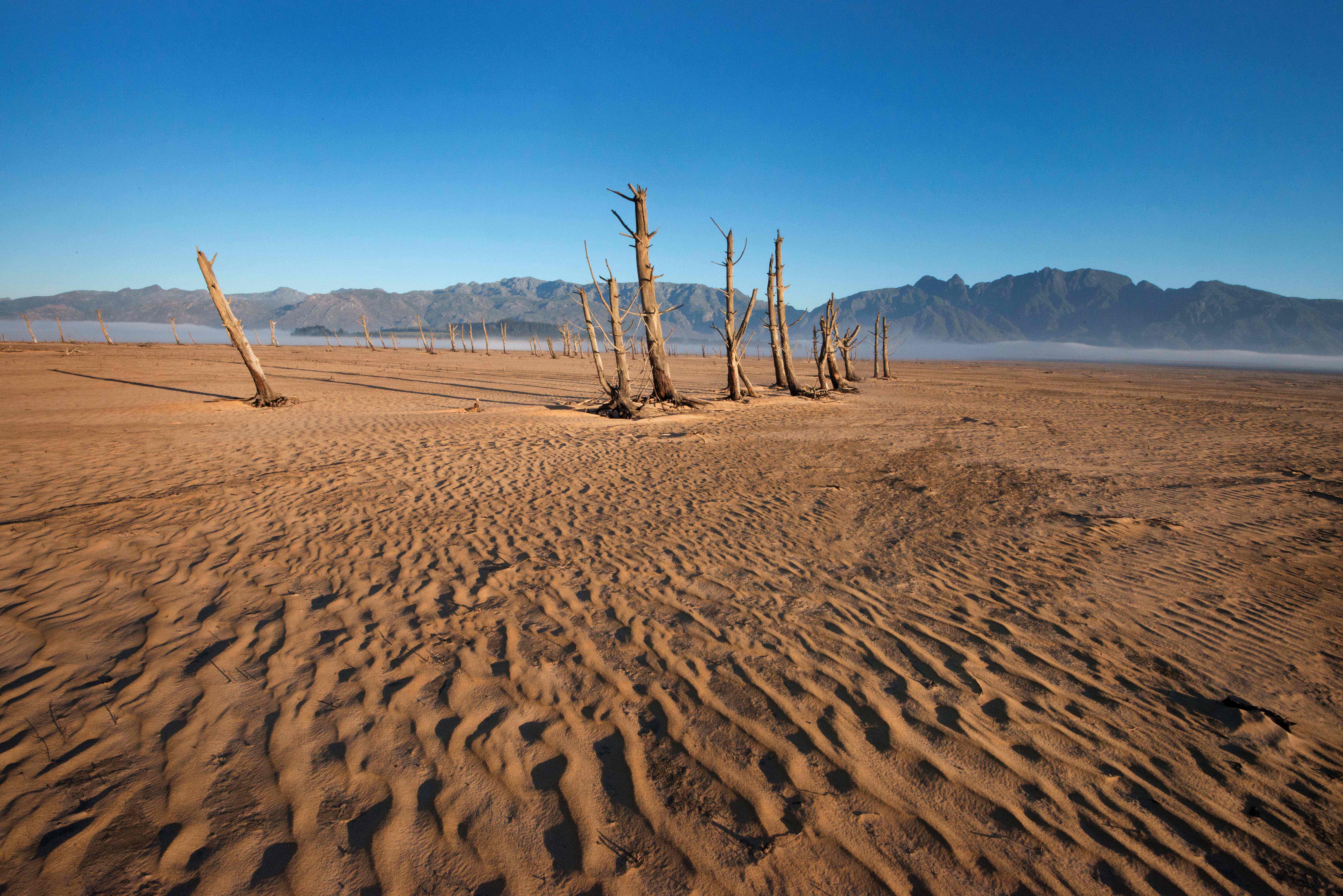Approaching Day Zero
With Cape Town nearing "Day Zero," the world may be seeing a grim portent of a drier future

With Cape Town nearing "Day Zero," the world may be seeing a grim portent of a drier future. Here's everything you need to know:
What is Day Zero?
It is the date, currently set as July 9, when officials believe Cape Town will run out of water. Three years into the region's worst drought in a century, the reservoirs supplying South Africa's second-most-populous city are almost empty. Its 4 million residents are already restricted to just 50 liters of water each per day — Americans, by comparison, use about 370 liters — with heavy fines for those who exceed that limit. If the reservoirs drop below a certain level, officials will turn off the municipal supply everywhere except hospitals, schools, and other key institutions. Residents will then be limited to 25 liters a day, which they'll have to collect from one of just 200 stations around the city — one for every 20,000 people. With violence and unrest anticipated, armed police and soldiers will be stationed at each collection point. "The government's first and foremost priority," says Patrick Reed, a sustainable water management expert at Cornell University, "is going to be to try to quell anarchy."
The Week
Escape your echo chamber. Get the facts behind the news, plus analysis from multiple perspectives.

Sign up for The Week's Free Newsletters
From our morning news briefing to a weekly Good News Newsletter, get the best of The Week delivered directly to your inbox.
From our morning news briefing to a weekly Good News Newsletter, get the best of The Week delivered directly to your inbox.
Can it be prevented?
Day Zero is by no means inevitable. The cutoff date has already been pushed back from April 16, and the upcoming rainy season could replenish supplies. But experts warn that in the 21st century, water shortages will become increasingly common across the world, as climate change makes prolonged droughts more common and more extreme. The rapid population growth that helped cause the crisis in South Africa — Cape Town has doubled in size in the past two decades — is happening everywhere. The global population is now projected to grow from today's 7.7 billion to 9.8 billion by 2050 and 11.2 billion by 2100. The World Meteorological Organization estimates that two-thirds of all humans on the planet will face periodic or frequent water shortages by 2025. A panel of retired U.S. military officials concluded last year that water scarcity will become "a growing factor in the world's hot spots and conflict areas," with shortages leading to "widespread" civil unrest and violence and water supply becoming a "valuable tool in the operational strategy for belligerents."
Which regions are vulnerable?
The Middle East and North Africa are most likely to suffer. Rainfall in these already dry regions is forecast to decrease by 20 percent by the end of the century because of climate change, while their populations are on course to double to 600 million by 2050. The five countries with the lowest renewable freshwater resources per person are all in the Middle East — Kuwait, Bahrain, the United Arab Emirates, Egypt, and Qatar — and Sanaa, Yemen's dry inland capital, is expected to run out of water within a few years. But there are shortages across the world. Pakistan's government has warned that the entire country will lack sufficient water as soon as 2025; cities including Beijing, Shanghai, and Mexico City are pumping so much water out of underground aquifers that they are literally sinking. In the U.S., water levels in the country's largest reservoir, Lake Mead on the Colorado River, dropped 140 feet over 15 years and fell to 40 percent of capacity in 2015.
A free daily email with the biggest news stories of the day – and the best features from TheWeek.com
Where is conflict likely?
Flash points often occur where a river or aquifer stretches across national borders, raising questions over who owns the rights to the flow. That issue has become one of the key sticking points in the long-running standoff between India and Pakistan. In the Horn of Africa, Ethiopia has almost completed a $4.2 billion project to dam the Blue Nile with a massive hydroelectric power plant — a scheme that could reduce Egypt's share of water 2,000 miles downstream by up to 25 percent. "No one can touch Egypt's share of water," Egyptian President Abdel-Fattah el-Sissi warned last year. "Water to us is a question of national security." Many believe water will become the oil of the 21st century, driving major geopolitical decisions and creating a dividing line between those who have it and those who don't.
How can shortages be alleviated?
One deceptively simple solution is to fix old, leaky pipes, which account for about 40 percent of cities' lost water. Another is diversifying sources, to make populous areas less reliant on reservoirs that are vulnerable to drought. Desalination plants are effective but very expensive, making them unsustainable for poorer countries. In Los Angeles, officials have covered the surfaces of four reservoirs with millions of 4-inch plastic balls and shade covers — a technique they say reduces evaporation by up to 90 percent, saving 1 billion gallons of water a year. Agriculture and industry, which use the overwhelming majority of the world's water supplies, could be given financial incentives to use treated wastewater rather than groundwater. The key, experts say, is preparation. "Nature isn't particularly willing to compromise," says Mike Muller, former director of South Africa's Department of Water Affairs. "There will be severe droughts. And if you haven't prepared for it, you'll get hammered."
Life under water rations
A hotline for snitching on water-guzzling neighbors. Signs in café bathrooms reading "When it's yellow, let it mellow." Radio stations playing only two-minute songs to help people time their showers. Cape Town's residents are adapting to life under water rationing in innovative ways. Some wash their feet before going to bed, so they don't have to wash their sheets as often. Others proudly write "I'm saving water" in the layer of dirt on their cars. Restaurants encourage customers to use hand sanitizers rather than soap and water, and provide paper towels so that they don't have to launder linen napkins. And everyone, everywhere, uses buckets to collect and recycle much of the water they use. These measures have given some Capetonians a new perspective on their city. "There are many Cape Town residents in the poorer areas who are saying they've lived in Day Zero conditions all their lives," says resident Suzanne Buchanan. "It is certainly giving us more privileged citizens pause for thought."
-
 How to financially prepare for divorce
How to financially prepare for divorceThe Explainer Facing ‘irreconcilable differences’ does not have to be financially devastating
-
 Why it’s important to shop around for a mortgage and what to look for
Why it’s important to shop around for a mortgage and what to look forThe Explainer You can save big by comparing different mortgage offers
-
 4 ways to save on rising health care costs
4 ways to save on rising health care costsThe Explainer Health care expenses are part of an overall increase in the cost of living for Americans
-
 How Bulgaria’s government fell amid mass protests
How Bulgaria’s government fell amid mass protestsThe Explainer The country’s prime minister resigned as part of the fallout
-
 Femicide: Italy’s newest crime
Femicide: Italy’s newest crimeThe Explainer Landmark law to criminalise murder of a woman as an ‘act of hatred’ or ‘subjugation’ but critics say Italy is still deeply patriarchal
-
 Brazil’s Bolsonaro behind bars after appeals run out
Brazil’s Bolsonaro behind bars after appeals run outSpeed Read He will serve 27 years in prison
-
 Americans traveling abroad face renewed criticism in the Trump era
Americans traveling abroad face renewed criticism in the Trump eraThe Explainer Some of Trump’s behavior has Americans being questioned
-
 Nigeria confused by Trump invasion threat
Nigeria confused by Trump invasion threatSpeed Read Trump has claimed the country is persecuting Christians
-
 Sanae Takaichi: Japan’s Iron Lady set to be the country’s first woman prime minister
Sanae Takaichi: Japan’s Iron Lady set to be the country’s first woman prime ministerIn the Spotlight Takaichi is a member of Japan’s conservative, nationalist Liberal Democratic Party
-
 Russia is ‘helping China’ prepare for an invasion of Taiwan
Russia is ‘helping China’ prepare for an invasion of TaiwanIn the Spotlight Russia is reportedly allowing China access to military training
-
 Interpol arrests hundreds in Africa-wide sextortion crackdown
Interpol arrests hundreds in Africa-wide sextortion crackdownIN THE SPOTLIGHT A series of stings disrupts major cybercrime operations as law enforcement estimates millions in losses from schemes designed to prey on lonely users